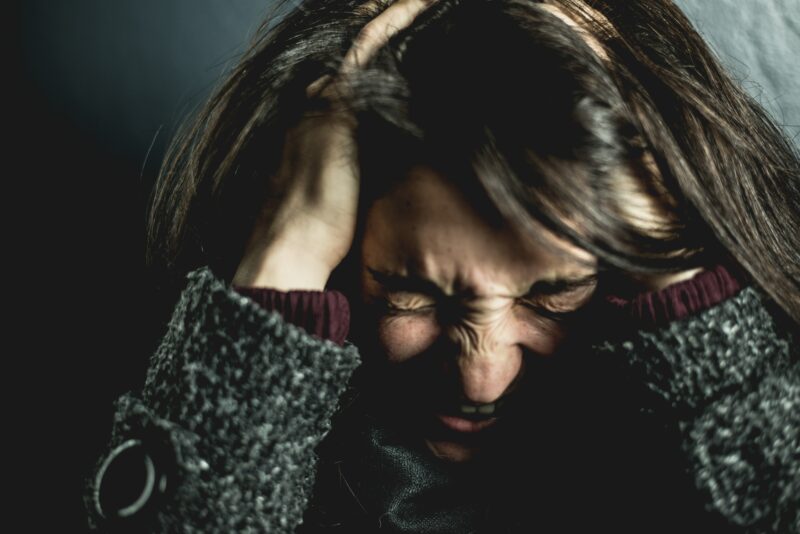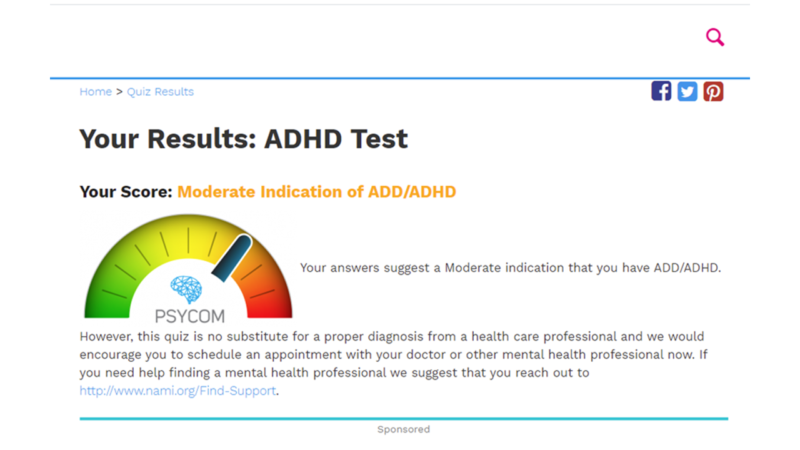(Photo is my results from psycom which is obviously NOT a diagnostic tool)
When we talk about ADHD we often picture a very hyper 8 year old boy, distracted in class and distracting in class. It was thought for a long time that ADHD was much more common in boys than it was in girls. However, that is not the case, it just manifests differently in boys than it does in girls.
This term, as I’ve explore my brain and my mental health. I’ve started wondering if I’ve had ADHD all my life, and I won’t lie, it was partially because of the TikTok algorithm that got me there, though someone with ADHD and my therapist also suggested it to me.
There are three “types” of ADHD Hyperactive ADHD and Inattentive ADHD, and combined. Women and girls tend to present with inattentive and it used to be known as ADD. The signs aren’t always obvious because those with inattentive ADHD aren’t usually disruptive, they may daydream, they may even be the teachers pet.
ADHD isn’t very well named. Attention Deficit Hyperactive Disorder, firstly it caters to that first group, secondly, it is named after how it affects others, not how it affects the person who has it.
From the probable dozens of videos I’ve seen by creators with ADHD, a common theme is that they follow the dopamine and positive stimulation, and any task has the potential to produce dopamine, which explains why some children with ADHD don’t have trouble in school. Praise from teachers and parents provides the dopamine their brain needs.
From what I’ve watched, those with ADHD really experience two states. Executive dysfunction, and Hyperfixation.
Executive dysfunction is the inability to do a task because you don’t have the dopamine to get you to do it. You WANT to do the task but you don’t, you sit and worry about the fact that you are not doing the task. On the outside it looks like the person is lazy because how hard is it to clean your room, on the inside not so much.
Hyperfixaton is when someone has found something that is providing a ton of dopamine to their brain and therefore, for some time it is really all they want to do, think or talk about. For instance, playing a video game at all hours of the day despite knowing you need to do other things like study, shower or eat.
So really, if we were to rename ADHD it would be better called Executive Dysfunction Disorder.
If we break it down this is how we tend to recognize someone with Hyperactive ADHD or Inattentive ADHD. From ADDitude, a site with many professional resources to those dealing with ADHD in themselves or loved ones, those with Hyperactive ADHD may:
- fidget
- have trouble staying seated
- run and climb when inappropriate or feel restless
- be unable to play/engage quietly
- is unable to stay stull
- talks a lot
- interrupts
- has difficulty waiting their turn
Wheras those with Inattentive ADHD
- have trouble paying attention to small details
- gets distracted during tasks and activities
- doesn’t seem to be listening when spoken to
- Doesn’t follow instructions
- Has trouble finishing tasks
- Has trouble with organization of time and space
- Avoids tasks that require sustained mental effort/procrastination
- Loses things
- Easily distracted by external stimuli
- Forgetful
It all boils down in the end to stimulation and dopamine.
However, many people, even professionals still look at ADHD as primarily something that looks like Hyperactive ADHD, and if a student is doing well in school, it is unlikely they will get a diagnosis. Because of this many women don’t get diagnosed until adulthood, if ever. Thankfully with the internet and social media more and more people are able to realize that they may be more than lazy and disorganized.
So, why do I think it is possible I have it? I get distracted easily, I fidget and sway a lot, I often have to remind myself not to interrupt people, I lose my keys constantly, I procrastinate until the last possible second but do extremely well under pressure, I get obsessed with something for weeks and then don’t touch it again for months, housework is extremely hard for me to complete without some other kind of stimulation like Netflix or music (and that doesn’t always work).
I’m not saying I have it, and I’m not even saying I will ever get tested to see if I have it. I might just be lazy and disorganized and looking for an excuse, either way, I’ve made it this far and honestly it is the least of my worries, but it is interesting. Right now I am kind of operating under the assumption that I might have it, so I do some things that help me get along. I “body double” which means I work with someone over video call when I have to work on schoolwork and just having someone else in the space keeps me on task, I sometimes try to trick my brain with rewards and to-do lists that use my current fixation as motivation to get through the tasks (doesn’t always work), I put notes up to remind me to do things that I forget about like taking out the garbage and I use Routinery (when I remember) to keep to a structured routine that has me actually functioning like an adult.
So, while I doubt I’ll ever to much to address it, realizing this I believe will make me more aware of students in my class, and hopefully I won’t be the reason a girl is struggling silently and unnoticed.







